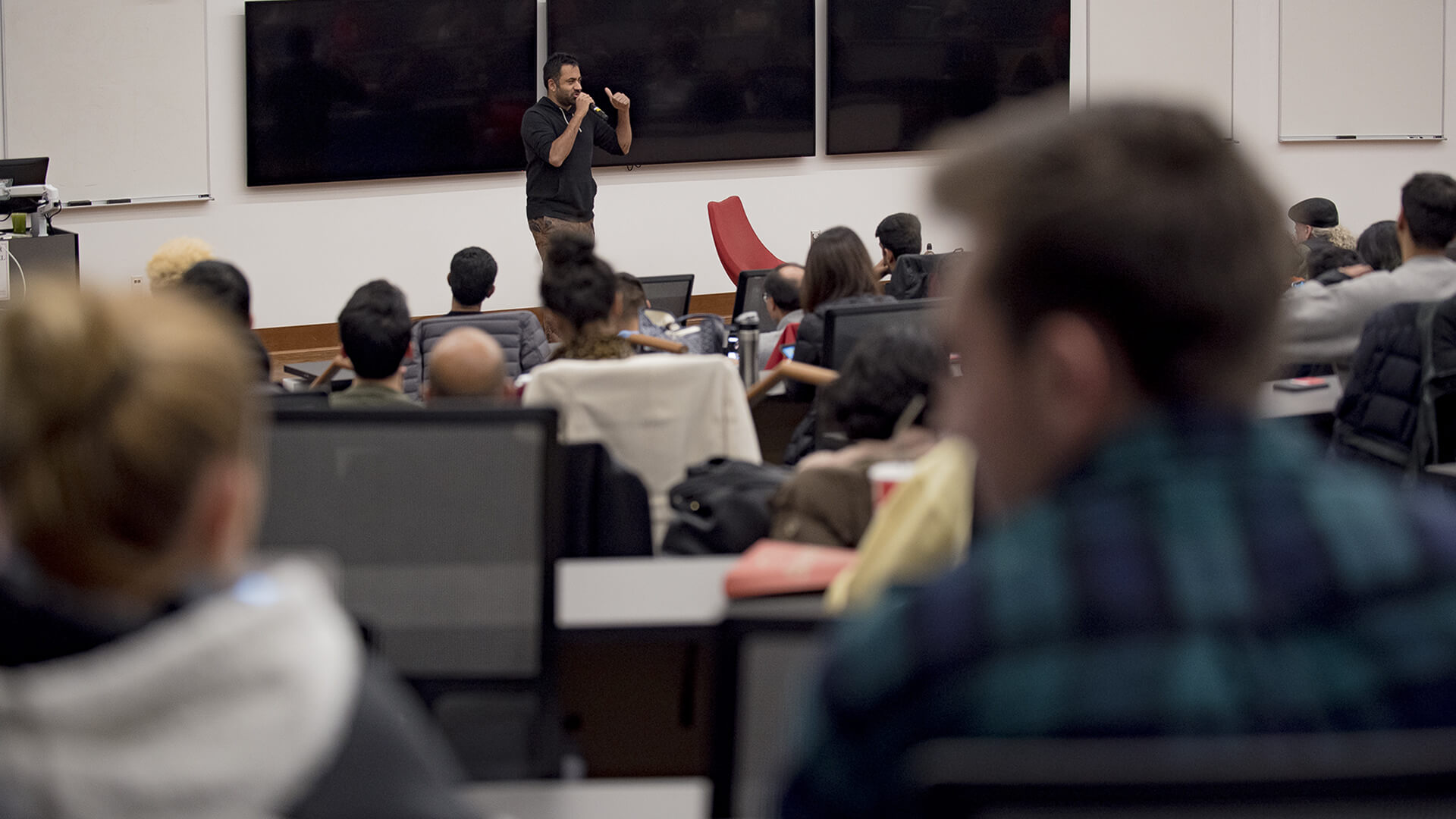- December 06, 2019
- By Dan Novak M.Jour. ’20
Actor, director, producer and former Obama White House staffer Kal Penn screened a DACA-themed episode of his sitcom “Sunnyside” on the UMD campus yesterday. But he wears an even more important title, according to some in the crowd, who called him the "OG" Asian-American comedy star.
In the 15 years since he co-starred in the iconic stoner comedy “Harold & Kumar Go to White Castle, Hollywood has made significant progress toward TV diversity, with the releases of shows like “ Black-ish,” “Atlanta” and “Fresh Off the Boat.”
And in “Sunnyside,” named after the neighborhood in Queens, New York, Penn created what just might be the most diverse show in the history of network television.
“It’s something we’re very proud of,” Penn told the rapt group in the Edward St. John Learning and Teaching Center. “And that’s not just in front of the camera, that’s behind the camera.”
The show, through its writers, reflects the world and life experiences of a culturally mixed New York City. Characters include an Ethiopian immigrant, a Dominican immigrant, a Chinese American and a Korean American.
Penn said he wanted to create a comedy as relatable as “Seinfeld,” but with a set of characters more representative of the city.
“’Seinfeld’ was really funny to me, but I don’t know that white version of New York,” Penn said. “What I do know is that like 80% of Indian uncles are like George Costanza.”
The sitcom premiered on NBC in September, but its future seems to be up in the air, with the network canceling the show earlier this fall, but continuing to stream new episodes on NBC.com and Hulu. In the latest episode, shown yesterday, one of the main characters, Brady, reveals to his fraternity brothers that he can’t leave the country for a spring break trip to Cabo San Lucas because he’s an undocumented immigrant and federal DACA (Deferred Action for Childhood Arrivals) program recipient.
“I’m worried if they find out my status, they’re going to treat me differently,” Brady says. “They’re not going to me as the guy who chugged half a pitcher of beer, barfed it back into that pitcher, and then chugged the whole thing on a dare. They’re going to see me as an immigrant.”
Penn spoke with Terry K. Park, a lecturer in the Asian American Studies Program who teaches a course about Asian American representation in media, to discuss diversity in the entertainment industry. The event was sponsored by the Asian American Studies Program, the Office of Multicultural Involvement and Community Advocacy, the U.S. Latino/a Studies Program and the Undocumented Student Program.
Here are some takeaways:
Diversity is not just for show
Penn said that for too long, the industry viewed diversity just as adding more brown and black faces in the room—tokenization.
“OK, there’s one woman, one person of color in a writer’s room,” Penn said. “And that’s diversity, and they all celebrate.” A production that truly values its diversity, he said, encourages writers to portray their experiences through their characters.
“We thought if we found people that understand the experiences of people like this, they would bring them to life. So all our writers are either immigrants themselves or have family members who are immigrants.”
Representation beats stereotypes
Representation, Penn said, gives people of color a chance to be fully fleshed characters, and not just portray one-dimensional stereotypes, even if they’re positive ones. He said his “Harold & Kumar” co-star, John Cho, has lamented being cast as a “nice Asian cop.”
“We wanted our characters to have immense flaws like everyone does, but their flaws aren’t necessarily tied in to their ethnicity or their background,” Penn said.
Comedy can help make immigrant issues like DACA more palatable
The “Sunnyside” character Brady is white, an immigrant from Moldova and a reminder for viewers of a show with a cast of actors with Latin American and Asian backgrounds that complex immigration issues are not just linked to skin tones. While Penn doesn’t see his show as overtly political, “we’re also mindful of the reality of 2019. So I think having a face like his with something that’s a little more relatable was something that’s important.”
Topics
Campus & Community